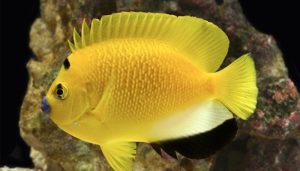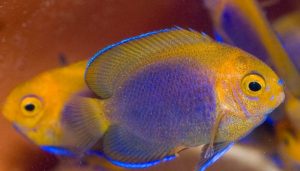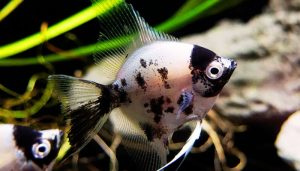Why do my guppies keep dying? Are you a new aquarium owner noticing a concerning trend of dead guppies? Or you’ve been keeping guppies for a while, but recently, you’ve seen a higher mortality rate than usual. So, why are my guppies dying?
Whatever the case, it’s crucial to identify the root cause of your guppy deaths to prevent further losses and maintain a healthy aquatic environment.
In this article, we’ll explore the top five reasons why guppies may die in your tank and provide practical solutions to address each issue.
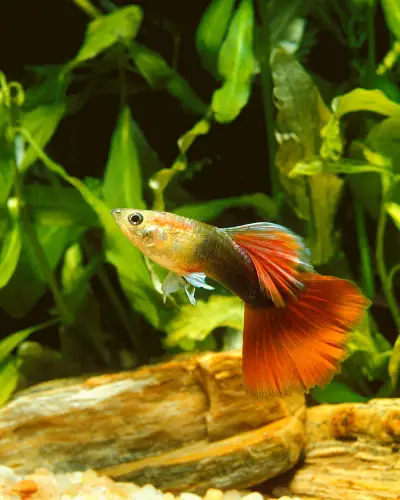
So, if you’re asking yourself, “Why are all my guppies dying?” keep reading to learn how to keep your fish happy and healthy for the long haul.
Table of Contents
ToggleWhy Are My Guppies Dying All of a Sudden?
Sudden guppy deaths can be caused by poor water quality, disease, stress, aggression from tank mates, and environmental factors. Guppies are sensitive to changes in water parameters, and poor tank water quality can lead to stress and illness, which can cause sudden death.
Common diseases, such as fungal, bacterial, and parasitic infections, can spread quickly and cause sudden death in guppies. Stress can weaken the immune system of guppies, making them more susceptible to disease and premature death.
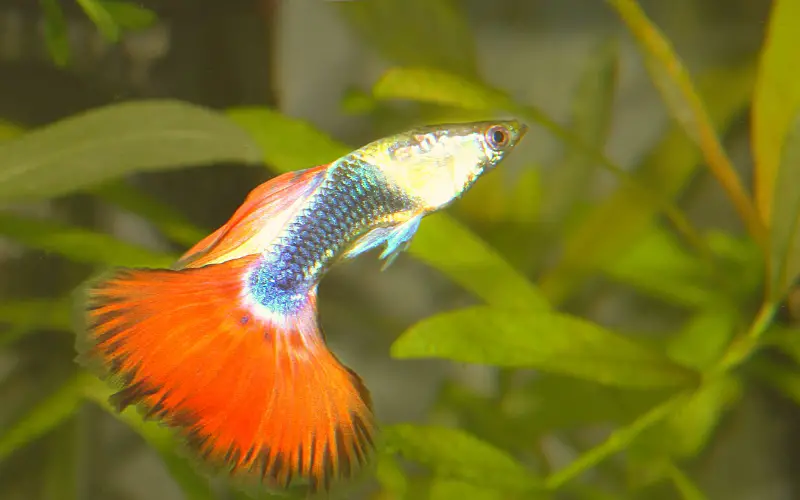
Aggression from tank mates can also lead to injury and anxiety, which can cause sudden death. Environmental factors, such as sudden changes in light or movement, can also cause stress in guppies and lead to sudden death.
Maintaining proper water quality, avoiding overcrowding, providing a stress-free environment, and seeking prompt veterinary advice can help prevent sudden guppy deaths.
What Are The Symptoms Of Dying Guppies?
The symptoms of dying guppies can be easily noticed if one is observant. Firstly, a significant decrease in activity levels is observed. Whereas healthy guppies are known for their constant swimming and playful behavior, dying ones tend to become lethargic and inactive.
Additionally, their appetite may decrease significantly or even disappear completely, leading to noticeable weight loss. Another prominent symptom is the change in their physical appearance.
Dying guppies may develop a pale or dull coloration, and their scales can become discolored or appear frayed. In some cases, fish may also experience difficulty swimming or display abnormal swimming patterns.
It is essential to monitor these dying symptoms closely, as they can indicate underlying health issues that need to be spotted on time to ensure the well-being of the guppies.
Understanding Guppies and Their Needs
– The Guppy Fish: An Overview
Guppies (Poecilia reticulata) are small, tropical fish native to South America. They are highly sought-after due to their vibrant colors, playful behavior, and adaptability to different environments. Guppies are known for their prolific breeding, making them popular among beginner and experienced fishkeepers.
– Creating the Ideal Guppy Tank
Several factors must be considered when setting up a guppy fish tank, including tank size, filtration, substrate, and decorations. Providing a tank environment that mimics their natural habitat ensures the well-being of these fish.
– Water Quality and Its Importance
Maintaining excellent water quality is paramount for the health of guppies. Regular testing of water parameters and understanding the nitrogen cycling process are crucial to preventing potential issues.
5 Common Reasons Why Guppies Keep Dying
1. Ammonia and Nitrite Spikes
One of the leading causes of guppy deaths is the presence of high ammonia nitrite and nitrate in the aquarium. These toxic substances can rapidly accumulate, especially in newly established tanks, leading to fatal consequences for the fish.
2. Poor Water Quality
Guppies are highly sensitive to poor water conditions, including high nitrate and nitrite levels. Neglecting regular water changes and tank maintenance can lead to stress and compromised immune systems in guppies.
3. Overcrowding and Aggressive Tank Mates
Overcrowding the aquarium or introducing aggressive tank mates can increase stress among guppies. Aggression and competition for resources can cause physical harm and affect their overall well-being.
4. Water Temperature Fluctuations
Guppies are tropical fish that require a stable and suitable water temperature range. Drastic fluctuations in temperature can weaken their immune systems, making them more susceptible to diseases.
5. Lack of Hiding Spaces
Inadequate hiding spaces can cause guppies to feel constantly exposed and stressed. Having places to retreat to is essential for their mental and physical health.
Best Solutions to Prevent Guppy Deaths
– Establishing the Nitrogen Cycle
To avoid ammonia and nitrite spikes, ensure your tank goes through the nitrogen cycle before adding the fish to a new tank. Beneficial bacteria will develop and help process harmful toxins.
– Regular Tank Maintenance
Perform routine water changes and tank cleanings to maintain optimal water quality and remove accumulated fish waste.
– Proper Feeding Practices
Avoid overfeeding your guppies, as uneaten food can lead to water contamination. Provide a balanced diet and feed them in controlled portions.
– Quarantining New Fish
Before introducing new guppies to your aquarium, quarantine them in a separate container to prevent the spread of guppy diseases.
– Monitoring Water Parameters
Regularly test your tank’s water parameters using a reliable test kit. This will help you recognize and address any issues promptly.
Why Is My Guppy Laying At The Bottom Of The Tank?
There could be several reasons your guppy lies at the bottom of the tank:
- It could be due to stress or illness. If the water conditions are not ideal or there has been a recent parameter change, your guppy may become stressed and exhibit abnormal behaviors, such as lying at the bottom. In such cases, closely monitor the water parameters and make necessary adjustments.
- Aggressive fish in the tank could be harassing the guppy, causing it to hide at the bottom. Creating a peaceful and harmonious tank environment ensures that compatible fish species are housed together.
- If the guppy is pregnant, it may seek a secluded spot near the bottom to give birth.
Look for any signs of pregnancy and provide appropriate hiding spots for the guppy’s safety and comfort.
Can Guppies Die After They Give Birth?
Guppies are tropical fish known for their vibrant colors and playful nature. They are also known for their rapid reproduction, as female guppies can give birth to many fry every few weeks.
However, giving birth can be quite taxing on the guppy fish. It can lead to exhaustion and even death in some cases. This occurs because giving birth requires a lot of energy, and the strain on their bodies can be too much for them to handle.
Additionally, the stress of the birthing process can weaken your guppy’s immune system, making them prone to diseases. Therefore, providing a comfortable and stress-free environment for guppies is essential to reduce their risk of dying after birth.
What Factors Can Cause a Guppy To Die While Giving Birth?
Several factors can cause a guppy to die while giving birth. These factors include poor water quality, aggressive tank mates, stress, and inappropriate water temperature.
Poor water quality is among the most common causes of guppy death during birth. Guppies are highly sensitive to changes in water parameters such as nitrate and nitrite levels, pH levels, and temperature range. If the water quality is not maintained at a suitable level, it can cause stress and illness in both the female and her fry, leading to death.
Another factor that can cause guppy deaths during birth is aggressive tank mates. Guppies are tropical fish that are generally peaceful, but they can become stressed and injured if housed with aggressive or territorial tank mates.
Male guppies, in particular, can be aggressive towards females during breeding, which can cause stress and physical harm.
Water temperature is also an essential factor to consider when breeding guppies. Guppies are a type of fish that require a water temperature between 73-82°F (22-28°C) for optimal health and breeding. If the water temperature is too high or low, it can cause stress and illness, leading to death.
Maintaining proper water parameters and performing regular water changes can help prevent guppy deaths during birth. Keeping the water in a separate tank during the birthing process is also recommended to reduce stress and minimize the risk of aggression from tank mates.
How to Keep Your Guppies Healthy?
There are a few key factors to consider for keeping guppies healthy. Regular tank water changes are crucial for maintaining good water quality in the aquarium.
Changing about 15-20% of the aquarium water is recommended. This helps remove toxins or waste buildup that could harm your guppy fish.
Additionally, beneficial bacteria in the tank help to break down nitrate and ammonia levels, so it is vital to not completely clean the tank during each water change, as this can remove the beneficial bacteria.
Feeding your guppies a varied diet of high-quality fish food is essential for their overall health. It is also important to provide plenty of hiding spots and plants in the aquarium for the guppies to feel secure.
Regular tank maintenance, monitoring the water parameters, and avoiding adding new fish without proper quarantine can help stop the spread of diseases to your guppies. Finally, if you plan to breed guppies, providing a separate tank for the guppy fry is crucial to ensure their survival.
Commonly Asked Questions about Why guppies are dying (FAQs)
Why do guppies die suddenly?
Guppies may die due to poor water quality, ammonia and nitrite spikes, and stress from aggressive tank mates.
How can I prevent overcrowding in my guppy tank?
Avoid holding too many fish in your aquarium; ensure it provides enough space for each guppy to thrive comfortably.
Can guppies survive in water with a low temperature?
Guppies are tropical fish and require a stable temperature range of around 72 to 82°F (22 to 28°C) to thrive.
What should I do if my guppies show signs of disease?
Isolate the affected guppies in a separate tank and treat them accordingly. Also, consider quarantining new fish before adding them to your main tank.
How often should I change the water in my guppy tank?
Regularly change about 20-25% of the tank water every week to maintain optimal water quality and ensure the well-being of your guppies.
Why are my guppies dying?
Why did my guppies die? There can be several reasons why your guppies are dying. Common reasons include poor water quality, improper tank maintenance, guppy diseases, incompatible tank mates, and sudden death.
What should I do to improve the water quality of my guppy fish?
To improve water quality for your guppy fish, you should regularly perform water changes, monitor and maintain proper water temperature, check nitrate and nitrite levels, and ensure the aquarium is filtered correctly.
How often should I perform water changes for my guppy fish?
It is recommended to perform regular tank water changes at least once a week for guppy fish. This helps in removing toxins and maintaining good water quality.
What temperature should I keep the water for my guppies?
Guppies prefer a water temperature of 72-82 degrees Fahrenheit (22-28 degrees Celsius). A tank heater is essential to maintain a stable temperature within this range.
Can high levels of nitrate and nitrite cause guppies to die?
Yes, high nitrate levels (above 40 ppm) and nitrite (above 0 ppm) can harm guppies and may cause them to die. It is crucial to test and maintain these parameters within the safe range regularly.
Can introducing new fish to my tank result in guppy deaths?
Introducing new fish to your tank can potentially lead to guppy deaths. It is vital to quarantine new pet fish before adding them to the main community tank to prevent the spread of sickness and ensure compatibility with the existing tank inhabitants.
Can a lack of oxygen in the tank cause guppies to die?
Yes, a lack of oxygen levels in the tank can be fatal for guppies. It is crucial to provide adequate surface agitation and aeration to ensure a sufficient oxygen supply for the fish.
Should I use tap water for my guppy tank?
If tap water contains chlorine or other harmful chemicals, using a water conditioner to remove these contaminants before adding the water to your guppy tank is recommended.
What should I do if my guppies suddenly die?
Why did my guppy die suddenly? If your guppies suddenly die, it is essential to investigate the possible causes. Check water parameters, observe any signs of disease or stress, and ensure proper tank maintenance. Taking appropriate action based on the findings can help prevent further losses.
Why are guppies considered hardy fish?
Guppies are hardy fish because they can adapt to a wide range of water conditions and tolerate some fluctuations in temperature, pH, and water quality. However, they are still protected from poor conditions or neglect, as they still require proper care and maintenance.
Can guppies survive in a small tank?
While guppies are known to adapt to various tank sizes, it is best to provide them with a tank of at least 10 gallons to ensure proper swimming space, water quality, and overall health. A larger tank also allows for better filtration and easier maintenance.
Conclusion
So, why are my guppy fish dying? In conclusion, guppies can thrive in a well-maintained aquarium with appropriate care and attention to their specific needs. By understanding the leading causes of why are my guppies dying and implementing preventive measures, you can create a healthy and vibrant aquatic community. Continuously monitor water quality, maintain the nitrogen cycle, and provide a stress-free environment for your guppies to flourish.
You might also like
- 5 Secrets to Achieving Ideal Guppies Water Parameters at Home!
- Raising Guppies in Ponds: A Comprehensive Beginner’s Guide!
- Are Guppies Hardy Fish: 5 Shocking Health Risks Revealed!
- Why Does My Water Tests Perfect but My Fish Keep Dying (Solved)
- Will My Guppy Die After Giving Birth? (5 Causes & Solutions)
- Do Guppies Need a Heater in the Tank: A Comprehensive Guide
- How Long Do Guppies Live in captivity: Prolong Your Guppy fish Lifespan
- Why Does My Guppy Look Bloated: 3 Surefire Ways to Save Your Fish!
- Will Rope Fish Eat Guppies: The Answer May Surprise You!
- Do Male Guppies Fight: (5 Expert Tips Say Yes!)
- What Eats Guppies: The 7 Fish You Need to Avoid!


